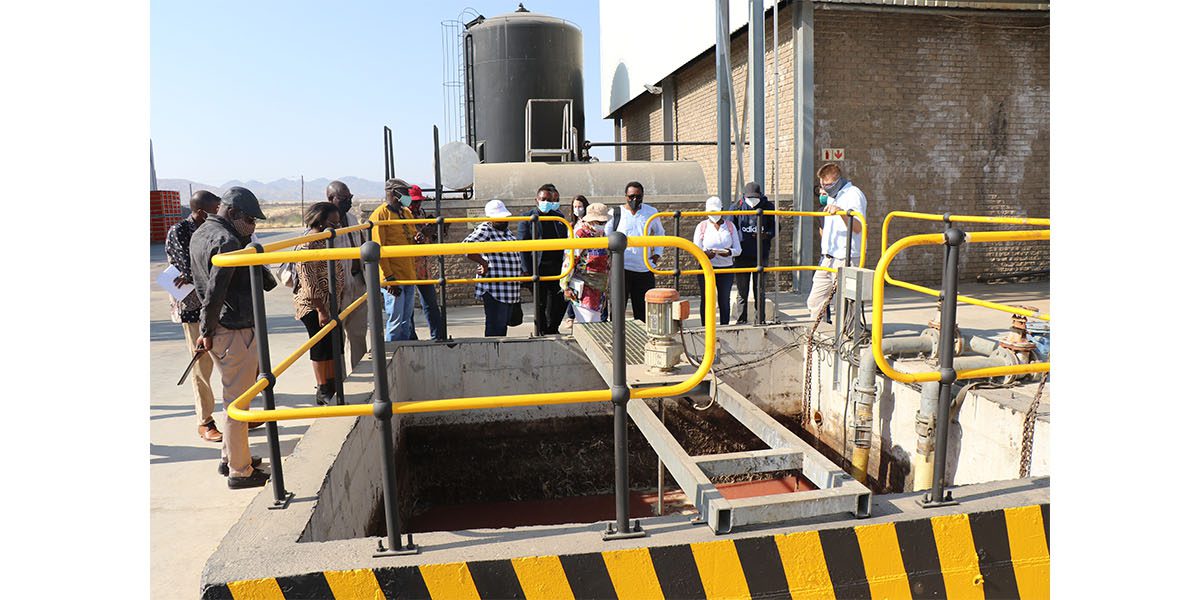Story by George Sanzila

Members of parliament visiting the Namib poultry industries where a number of eco-friendly projects are being developed as part of efforts to protect the environment and mitigate the effects of climate change.
Windhoek – Members of Parliament from the Parliamentary Standing committee on Natural Resources and the committee on Economics and Public Administration undertook site visits to various renewable and eco-friendly initiatives within the vicinity of Windhoek yesterday (13/09/2021). The visits are part of a project aimed at raising awareness about the effects of climate change and possible interventions.
The project initiated by the Ministry of Environment, Forestry and Tourism in collaboration with the Climate Change Adaptation Research in Africa (CLARE-Namibia), is being implemented by the University of Namibia (UNAM) and the Desert Research Foundation of Namibia (DRFN). Among the many issues that were discussed with lawmakers that had preceded the visits, include Namibia’s vulnerability to climate change and its impact on every facet of life including agriculture, water, marine life and public health among many others.
Even though Namibia’s carbon footprint is negligible, the country has nonetheless felt the effects of climate change such as droughts. As part of efforts to reduce global warming, Namibia has joined other countries that have ratified the United Nations Framework Convention on Climate Change (UNFCCC) and the Paris Agreement, all protocols aimed at limiting global warming to acceptable standards.
Members of Parliament yesterday visited renewable resources and eco-friendly projects being initiated at Namib poultry that include biogas and solar energy plants, recycling of water and the envisaged Africa Green Desert Park, an industrial park that is expected to employ eco-friendly practices that supports sustainable and circular economy solutions.
According to Helgo Horsthemke of Namib poultry, once completed, the biogas plant that will operate on chicken manure with zero water consumption, will become the first of its kind in Southern Africa. He further added that apart from protecting the environment, renewable energy initiatives have the potential to help reduce Namibia’s pressing energy dependence. Namibia’s over reliance on energy imports has seen the country buy over 60% of its power needs from the Southern African power pool.
Biogas, an environmentally friendly and renewable energy source is produced from organic waste. Waste producing entities such as Namib poultry will not only find a convenient way to dispose of waste without harming the environment but also benefit from the energy that is produced. Food programme specialist at Namib Mills, Namib poultry’s holding company, Suvi Plaatjie narrated what had prompted the sudden shift by the company to a more environmentally friendly approach.
“Namib poultry produces 40 tons of chicken manure and other chicken byproducts per day. The chicken production creates a lot of waste water. We were in a situation where the health inspectors told us that we need to purify our waste water. It was becoming an environmental risk. We then established a water purification plant to allow us to recycle our water six times. That also made us think about the bio-waste that we are producing and how we could utilize it. We thought that we could use the manure to make energy out of it” noted Plaatjie.
According to Plaatjie, the Namib Biogas plant, will have the capacity to produce 4.65 MW by using 40 tons of chicken waste per day. Over 34 tons of dry fertilizer will also be produced per day as a result. The power production will further be boosted by a solar plant which is already under construction. All projects are expected to be completed in November this year.
Namib poultry industry (NPI) is the largest poultry producer in the country. Plaatjie further revealed that an industrial park estimated to cost N$250 million is also envisaged. It is expected to serve as a one stop shop for businesses with eco-friendly practices such as reduction of waste and pollution.
Other projects visited include Eduventures, a non-governmental organization responsible for sensitizing Namibian school learners on issues related to the environment and sustainable development. MPs also visited the Habitat Research and training centre under the auspices of the Ministry of Urban and Rural Development responsible for research into sustainable housing and promotion of use of local and indigenous building materials and designs. Other projects to be visited by the lawmakers include the Aquaponics and Hydroponics projects in Windhoek on Thursday (16/09/2021).







